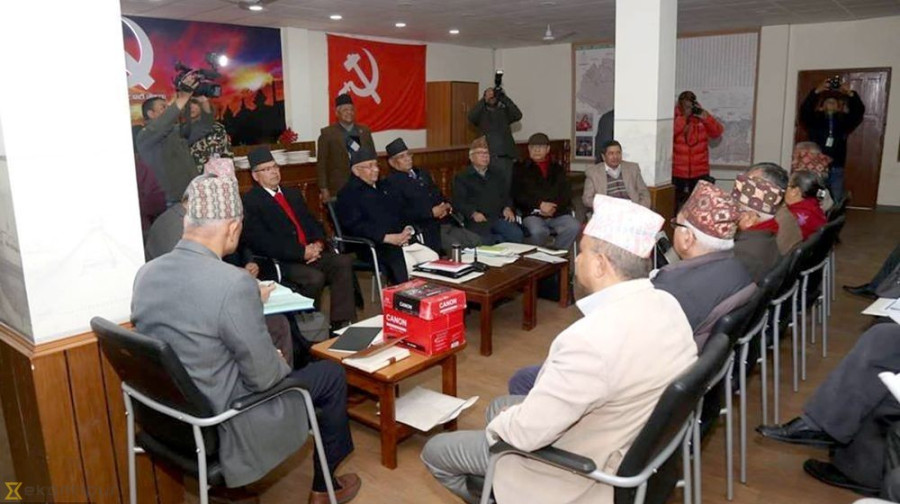National
In third Venezuela statement, ruling party tries to hit a diplomatic note
The Nepal Communist Party (NCP) on Monday issued what it called the party’s “official position” on the political situation in Venezuela, which some party insiders say was completely unnecessary but that it had to come as an attempt to prevent further damage to its relationship with the United States.
Tika R Pradhan
The Nepal Communist Party (NCP) on Monday issued what it called the party’s “official position” on the political situation in Venezuela, which some party insiders say was completely unnecessary but that it had to come as an attempt to prevent further damage to its relationship with the United States.
This is the third statement on the unfolding crisis in the Latin American nation in a span of two weeks—the first one was from a top leader of the ruling party, Pushpa Kamal Dahal, on January 25 and the second from the Ministry of Foreign Affairs on January 29.
The statement by NCP Co-chairman Dahal criticising the United States and its allies for interfering in the Venezuelan crisis had created an unease between Singha Durbar and US Embassy in Nepal. Dahal’s statement came at a time when Prime Minister KP Sharma Oli, another co-chair of the party, was out of the country.
Former foreign minister Mahendra Bahadur Pande, who has maintained a critical view of Dahal’s statement, described the fresh statement on Monday as “nonsense” and a wrong move on the part of the ruling party.
“There is no point in issuing a statement on issues like the Venezuela crisis which have minimal to no impact on Nepal,” Pande, a central member of the ruling party, told the Post.
“Even if there has to be an opinion from the Nepali side, it should maintain that such crisis should be resolved through peaceful dialogue,” he said. “[Our] statements should be on national interests. We need to be aware of geopolitics and economic politics.”
While Dahal reiterates that he stands by his statement, the Ministry of Foreign Affairs left its statement open to interpretation—some foreign policy experts called it a continuation of Dahal’s statement while others argued that it was distanced from what Dahal had said.
When the ruling party, through its secretariat meeting decision, released another statement on Monday, a day after the opposition Nepali Congress objected to the government’s and Dahal’s statements, it once again piqued curiosity.
“We decided to issue another statement on Venezuela crisis through the party’s official meeting,” party Spokesperson Narayan Kaji Shrestha told the Post when asked why another statement was required.
Not everyone agrees.
At least two NCP leaders told the Post that the latest statement was part of a damage control bid and that the ruling party was trying to tone things down.
A Standing Committee member of the ruling party, who spoke to the Post on condition of anonymity, said Monday’s statement was issued to “show it was the party’s official position—and not the one issued by Dahal” and also to tone his message down.
“The party felt the earlier statement lacked diplomatic finesse and there was a feeling among the party leaders that it could sour relations with the US and the international community,” the leader said.
Immediately after Dahal issued his statement, on the official letterhead of the NCP, the US Embassy in Kathmandu wrote to the Ministry of Foreign Affairs, asking for clarification on whether Dahal’s statement reflected Nepal’s official position on Venezuela.
Oli, when asked about Dahal’s statement upon his arrival from Davos, parried the questions, saying he was yet to read up on the matter.
Four days later, the Foreign Ministry issued its statement, in which it stopped short of calling names—the US and its allies.
Dahal’s statement carried some typical jargons that he used fondly during the time of war, terms like “imperialist” and “foreign interference”. His statement censuring the United States and its allies had also not gone down well in Washington, where American officials summoned Nepal’s Ambassador to the US, Arjun Karki, for clarification.
Last week the US ambassador to Nepal was absent at a diplomatic briefing by Foreign Minister Gyawali. Party leaders said Oli also briefed the secretariat on Monday about the absence of the American ambassador to Nepal during the diplomatic briefing.
A member of the ruling party’s international department said that by issuing a new statement, the party wanted to send a message that Dahal’s statement did not reflect the official position of the communist party.
In the new statement, the party has chosen its words carefully, stopping short of calling any name—neither Venezuela nor the US.
“Our party’s view and policy on foreign policy and international relations is clear and firm and is committed to the UN Charter and Panchsheel. Our party is for world peace, cooperation and prosperity,” the new statement reads.
The party member who asked to stay anonymous because he feared political consequences said the party had carefully picked phrases like “world peace” and “our policy is clear and firm”.
“In diplomatic terms, the phrase ‘world peace’ implies ‘we want to make peaceful relations with the great powers of the world,’” he said. “And by choosing the term ‘our policy is clear and firm’, the party has said Dahal’s statement was an aberration.
Read: Ministry distances itself from Dahal’s criticism of US and its allies




 14.24°C Kathmandu
14.24°C Kathmandu















